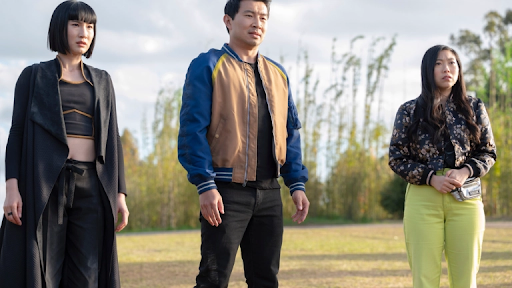Film Review: Shang-Chi and the Legend of the Ten Rings

Image Courtesy of Jasin Boland/Marvel Studios
By Dean Robbins
Father and mother, sister and brother, nature and invention, East and West. Marvel’s latest film Shang-Chi and the Legend of the Ten Rings, the 25th installment in the ongoing Marvel Cinematic Universe, is a film of duality. Shaun (Simu Liu) is a valet driver at a high-end hotel in a will-they-won’t-they friendship with co-worker Katy (Awkwafina). A mundane life that is soon revealed to be extraordinary. Shaun holds a secret: his father Wenwu (Tony Leung) wields a mystical weapon called the Ten Rings in a historic campaign of crime and conquest. Soon enough, Shaun finds himself pulled back into the world he so desperately wanted to leave.
Director and co-writer Destin Daniel Cretton, best known for the heart-wrenching film Just Mercy (2019), and his two co-writers, Dave Callaham and Andrew Lanham, embrace the film’s contradictions, contrasts, and clashes. The highlights of the whole endeavor are the action set pieces scattered through the runtime. Some scenes may remind the audience of the gravity-defying action of films like Crouching Tiger, Hidden Dragon (2000), but Shang-Chi never settles on one particular style, whether Western or Eastern. One scene, a fraught fistfight on a moving bus, establishes a clear sense of unreality in its effects and physics while also featuring hard-hitting, impact-focused cinematography. One can never say that a particular action sequence is a wuxia (martial arts) tribute, a comedy action scene in the vein of Jackie Chan, or even a traditional Bourne-cribbed Marvel set piece. It is simultaneously all of it yet something wholly itself.
Outside of these pulse-pounding scenes, the story unfortunately fails to stay on the same pace. The standard Marvel quips and emotional moments work more often than not. When “Shang-Chi” steps out into unfamiliar story territory, it often asks that you accept the events on-screen more than understand them. World-building is not the primary concern and that aspect which sits on the backburner begins to have a greater impact as the film moves forward. Despite this lack, the film is fiercely creative, but again contradicts itself because it does not want to explain its creations to its viewers. Of course, some meaning may be revealed with a greater knowledge of Chinese mythology, a deep well the film returns to several times.
What Shang-Chi is actually concerned with is the tension between its many dualities and the dualities that plague its characters. It is a movie chiefly about one’s identity being rooted in two seemingly opposed worlds: China and America, submission to nature and the will to power, and life and death. In one critical conversation, Wenwu explains the importance of a name, especially for Chinese-Americans. What does it mean to change your name? How does that obscure or reveal one’s identity? In a country where names are quickly abandoned in fealty to that dreaded, all-consuming Americanization, this theme is sure to resonate not only with Chinese-Americans but all immigrants and descendants of immigrants. By the time the credits roll, the film and the characters find a way to embrace all of their contradictions. All in all, Shang-Chi and the Ten Rings is a must-watch for MCU fans but less essential for those further out of the comic-cultural loop. Still, I cannot see many people leaving the theater disappointed. But a little confused? Perhaps.





